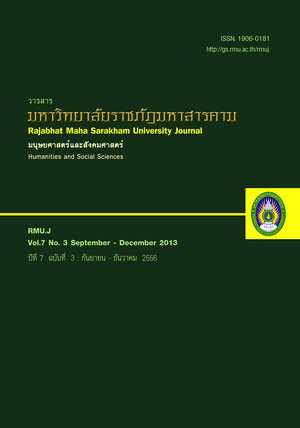การให้คำปรึกษากลุ่มโดยใช้การบำบัดแบบเผชิญความจริงให้ตระหนักในคุณค่าตนเองกับเด็กและ เยาวชนกระทำผิดในสถานพินิจและคุ้มครองเด็กและเยาวชนจังหวัดร้อยเอ็ด
Main Article Content
บทคัดย่อ
บทคัดย่อ
การกระทำผิดทางอาญาของเด็กและเยาวชนเป็นปัญหาอย่างยิ่งในสังคมไทย ผู้มีส่วนเกี่ยวข้องทั้งหลายได้พยายามหาทางป้องกัน และแก้ไขปัญหานี้มาโดยตลอด การพัฒนาพฤติกรรมของผู้กระทำผิดถือเป็นวิธีหนึ่งที่ใช้ลดจำนวนผู้กระทำผิดได้ การวิจัยครั้งนี้ เป็นการวิจัยกึ่งทดลอง มีวัตถุประสงค์เพื่อพัฒนาพฤติกรรมของผู้กระทำผิดโดยใช้วิธีการปรึกษากลุ่มบำบัดแบบเผชิญความจริงให้ มีความตระหนักในคุณค่าตนเองเพิ่มขึ้น กลุ่มตัวอย่างคือเด็กและเยาวชนในสถานพินิจและคุ้มครองเด็กและเยาวชนจังหวัดร้อยเอ็ด จำนวน 5 คน ซึ่งได้มาโดยการคัดเลือกแบบเจาะจงจากกลุ่มตัวอย่างที่มีฐานความผิดคล้ายคลึงกัน และสมัครใจที่จะพัฒนาตนเอง โดยใช้เครื่องมือที่ผู้วิจัยสร้างขึ้นเอง 3 ชุด ดังนี้คือ 1. แบบสังเกตเกี่ยวกับบุคลิกลักษณะตนเองเพื่อใช้ประเมินก่อนและหลังการให้ คำ ปรึกษาแบบ 3 มิติ ซึ่งประกอบด้วยมิติผู้ปกครอง มิติเจ้าหน้าที่และ มิติเพื่อน 2. โปรแกรมการให้คำปรึกษากลุ่มบำบัดแบบเผชิญความ จริง 8 โปรแกรม 3. แบบสอบถามการเห็นคุณค่าในตนเอง จำนวน 25 ข้อมีค่าความเชื่อมั่นทั้งฉบับเท่ากับ 0.79 วิธีดำเนินการ ลำดับ แรกผู้วิจัยได้อธิบายให้ผู้ปกครอง เจ้าหน้าที่ และเพื่อนของกลุ่มตัวอย่างเข้าใจวิธีใช้แบบสังเกตเกี่ยวกับบุคลิกลักษณะตนเองแล้วใช้ แบบฟอร์มดังกล่าวประเมินกลุ่มตัวอย่าง ลำดับถัดมาผู้วิจัยให้กลุ่มตัวอย่างตอบแบบสอบถามการเห็นคุณค่าในตนเองจำนวน 25 ข้อ แล้วจึงให้กลุ่มตัวอย่างเข้ารับการให้คำปรึกษากลุ่มบำบัดแบบเผชิญความจริง 8 โปรแกรม ๆ ละครั้ง ๆ ละ 90 นาทีรวม 8 ครั้ง หลัง การปรึกษากลุ่มผู้วิจัยให้กลุ่มตัวอย่างตอบแบบสอบถามการเห็นคุณค่าในตนเองอีกครั้งพร้อมทั้งให้ผู้ปกครอง เจ้าหน้าที่ และเพื่อน ของกลุ่มตัวอย่างใช้แบบสังเกตเกี่ยวกับบุคลิกลักษณะตนเองประเมินกลุ่มตัวอย่างอีกครั้งแล้วนำคะแนนจากการที่ให้กลุ่มตัวอย่าง ตอบแบบสอบถามก่อนและหลังการปรึกษากลุ่มมาเปรียบเทียบความแตกต่างโดยวิธีทดสอบทางสถิติของ วิลคอกสัน เพื่อพิสูจน์ สมมุติฐานก่อนและหลังการให้คำปรึกษา ผลการวิจัยพบว่า
เด็กและเยาวชนที่ได้รับการให้คำปรึกษากลุ่มบำบัดแบบเผชิญความจริงได้ตระหนักในคุณค่าตนเองโดยรวมสูงขึ้นอย่างมีนัย สำคัญทางสถิติที่ระดับ .05 จากผลดังกล่าวจึงควรให้เจ้าหน้าที่ที่เกี่ยวข้องนำโปรแกรมการให้คำปรึกษา กลุ่มบำบัดแบบเผชิญความ จริงไปใช้กับเด็กและเยาวชนที่กระทำผิดในสถานพินิจและคุ้มครองเด็กและเยาวชนเพื่อเพิ่มความตระหนักในคุณค่าตนเองซึ่งจะนำไป สู่การลดพฤติกรรมที่เป็นปัญหาต่อไป
คำสำคัญ : การกระทำผิดของเด็ก, การให้คำปรึกษากลุ่ม, การบำบัดแบบเผชิญความจริง, การตระหนักในคุณค่าตนเอง
ABSTRACT
Juvenile delinquency becomes a serious problem in Thailand. Relevant sectors have been making their great efforts on the prevention and solution of this problem. Improvement of personal behavior is known to be effective in reducing numbers of juvenile delinquents. This thesis is a quasi-experimental research on group counseling using Reality Therapy for self-esteem, so as to improve personal behavior of the juvenile delinquents. Five samples of children and adolescents who had similar penalty and volunteered to have self-improvement were specifically selected from the population in Juvenile Training Center, Roi - Et Province. Tools used in this study included 1).a structural observation form on self-personality before and after the group counseling in three dimensions including parents, officers and friends, 2) a questionnaire on self-esteem including twenty-five questions with 0.79 confidence level, and 3) eight programs for group counseling using Reality Therapy. All of them are author-original.
As the research process, firstly, three dimensions of observers including parents, officers and friends were well trained on how to use the self-personality observation form. Afterwards, they assessed five selected samples of children and adolescents for their self-personality and filled in the forms. Then five samples were arranged to answer twenty-five questions in the questionnaire on their self-esteem as a pre-test. Consequently, eight programs for group counseling based on Reality Therapy were applied to the five samples. Each program employed ninety minutes per once. After that the five samples were managed to answer the self-esteem questionnaire again as a post-test. Similarly, the three observers also assessed the samples and fill in the observation form for the post test. Derived scores before and after the Reality Therapy were compared using The Wilcoxon Matched Pairs Signed-Ranks Test to prove pre and post assumptions. Results revealed that the juvenile delinquents who had experienced the group counseling based on Reality Therapy had increased their self-esteem with the significance level of .05. Accordingly, the relevant officers should apply these Reality Therapy programs to the juvenile delinquents in order to increase their selfesteem which would lead to the reduction of their problem behavior.
Keywords : Juvenile Delinquency, Group Counseling, Reality Therapy, Self-esteem
Article Details
1. บทความที่ลงตีพิมพ์ทุกเรื่องได้รับการตรวจทางวิชาการโดยผู้ประเมินอิสระ ผู้ทรงคุณวุฒิ (Peer Review) สาขาที่เกี่ยวข้อง อย่างน้อย 3 ท่าน ในรูปแบบ Double blind review
2. ข้อคิดเห็นใด ๆ ของบทความที่ลงตีพิมพ์ในวารสารมหาวิทยาลัยราชภัฏมหาสารคาม นี้เป็นของผู้เขียน คณะผู้จัดทำวารสารไม่จำเป็นต้องเห็นด้วย
3. กองบรรณาธิการวารสารมหาวิทยาลัยราชภัฏมหาสารคาม ไม่สงวนสิทธิ์การคัดลอกแต่ให้อ้างอิงแสดงที่มา


